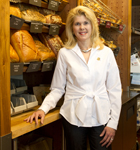This is nothing like your mother’s Tupperware party. When you host a so-called House Party, named after the firm that manages the process, you’re stepping into the cutting edge of social-media marketing. You provide the venue and the guests; House Party provides a digital party-management platform and product-related party supplies. And the companies that hire House Party? “They get double-digit brand lifts, strong ROI, and millions of conversations spread about their products in a very authentic way,” says Chris Maher, CEO of House Party. That’s quite a sell, so we tracked Maher down to have him elaborate.
This is a very new business model, isn’t it?
Maher: It’s a new take on the concept of earned media. Traditional media is paid (as in television or print ads) or owned (as in a website or product packaging). With earned media, you get consumers to do the work for you. We’re driving consumer recommendations to help build brands and increase sales. House Party is a unique offering that brings together earned media in a really engaging way. It connects the digital and physical worlds through a memorable experience.
Who are your clients?
Maher: Our sweet spot is consumer-packaged goods advertisers like Kraft, Kimberly Clark, and Diageo. They’re looking for two things: are you changing hearts and minds of consumers, and are you opening their wallets? We do both of those things very well by selecting brand advocates from our community of social influencers and getting them to host parties in their homes.
How do you select hosts?
Maher: First, our clients tell us who they’re looking for. For example, Kimberly Clark’s Pull-Ups division wanted to hold parties to help mothers potty train their kids. They were looking for women with children between the ages of 18 and 36 months. We took their input, in addition to our requirements for a strong social profile, and then found 15,000 ideal brand advocates in our community to host “Potty Dance” House Parties.
What is this “community?”
Maher: Our community has more than 800,000 registered users, and all can apply to host our parties. But we select hosts based on social influence and brand advocacy. We get a lot of information about these people when they register, and we watch them interact with our platform. Hosts are very active socially; they have twice as many Facebook friends as the average person, and they Tweet three times as much. They’re also are true brand advocates: they’re the people who enjoy introducing their friends to new things.
Is a House Party anything like a Tupperware party?
Maher: Well, it’s a party, but we don’t sell anything. We provide a platform for hosts to manage the party process. They get a personalized, branded party page, which they use to plan their party and invite guests. We give them recipes and ideas for party activities, one-touch social sharing so they can send messages to Facebook and Twitter, and the ability to upload photos and videos. That’s all a buildup to the actual party. For party day, we work with hosts to create a theme and messaging, and we ship them a party pack that contains all kinds of great stuff—product samples, coupons, gift cards, and branded party favors. For Pull-Ups, it was all about getting kids excited about potty training, transitioning them from one type of diaper to another, so we shipped a DVD with the Potty Dance music video, blow-up air guitars, a mat with footprints showing kids how to do the dance, product coupons, and fun party favors.
Is there anything holding the company back?
Maher: No, I’m really excited about our future. Since I joined House Party, we’ve made some important changes. The business was underinvested on the sales and marketing side, so we’ve fixed that. On the product side, we’ve relaunched the House Party platform so we’re better at spreading conversations and recommendations on a large scale. With brand marketers’ growing focus on earned media and the power of word-of-mouth marketing, I believe we are perfectly poised for success.

